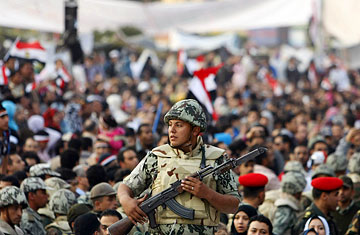After the news rocked the country when it happened, it hardly got a mention anywhere that this week marked the first anniversary of the death of Egyptian international footballer Mohamed Abdel-Wahab at the age of 23, from a sudden heart attack while training.
What was mentioned, though, were several other players who have met the same fate as that of Abdel-Wahab in just the past two weeks.
Unbelievably, four players — Antonio Puerta of Seville, 22, Zambian Chaswe Nsofwa of Hapoel Beersheba in Israel, 27, Walsall youth team player Anton Reid, 16, and most recently Jairo Andres Nazareno, 21, from Ecuador — have died of heart failure, and a fourth, Leicester City s Clive Clark, also collapsed during a game but is now recovering.
I didn t know any of these players; I d never even heard of them. Yet you can t help being saddened by their deaths. You can t help wondering if any or all of their deaths could have been prevented; and they died playing a game that they and millions others love. Although I don t know if that last part makes it better or worse.
The question most people are asking is how this can happen to professional athletes, apparently at the peak of fitness. We do know that because they have been exercising vigorously, many athletes who collapse during competition do not have enough oxygen in their bodies to allow the heart to start pumping again. Exercise produces adrenalin, which can worsen the condition and result in a sudden heart attack.
Many fatal heart attacks are caused by an irregular heartbeat. Adrenaline produced during exercise may overstimulate the heart so that it essentially short-circuits. When that happens, there may only be seconds or minutes to save an athlete s life.
FIFA, world soccer s governing body, deemed the risk of irregular heartbeats to be so great that before last year s World Cup in Germany, its medical committee demanded that all players undergo heart scans. Following the recent deaths, FIFA said it was considering expanding health checks.
Cardiac problems like an abnormal heartbeat are exacerbated by rigorous exercise in a way that can be fatal in athletes, and regular testing for the problem could save lives. Italy is the only country that mandates heart screening of all its professional athletes.
Since 1981, Italian authorities have run heart checks on all competing athletes. The incidence of sudden, fatal heart attacks has dropped from four cases per 100,000 to 0.4 cases per 100,000.
Concerns have been raised about the effectiveness of the scan, which relies largely on echocardiograms, a test that shows if the heart is pumping normally. As a screening test, it s imperfect, since although it can pick up many of the things that cause sudden death, it cannot detect all of them.
Not all athletes with suspicious tests will collapse on the field. Athletes genetically predisposed to have an irregular heartbeat might not even be aware of their condition until it s too late.
Athletes may have a silent but dangerous heart disease that s not manifest. Coaches should pay more attention to their players symptoms. If an athlete is complaining about chest pains or shortness of breath, those are warning signs that should not be ignored.
It s also time we considered whether we are simply asking too much of the players. Is it time to make a drastic cut in the number of games we ask our top players to play? The game is played at a torrid pace these days and the number of matches top-level players are involved in every season has reached a critical point.
We can name a full squad of young, supposedly healthy players from Africa to South America to Asia to Europe who have died suddenly. They lost much more than just a game.


